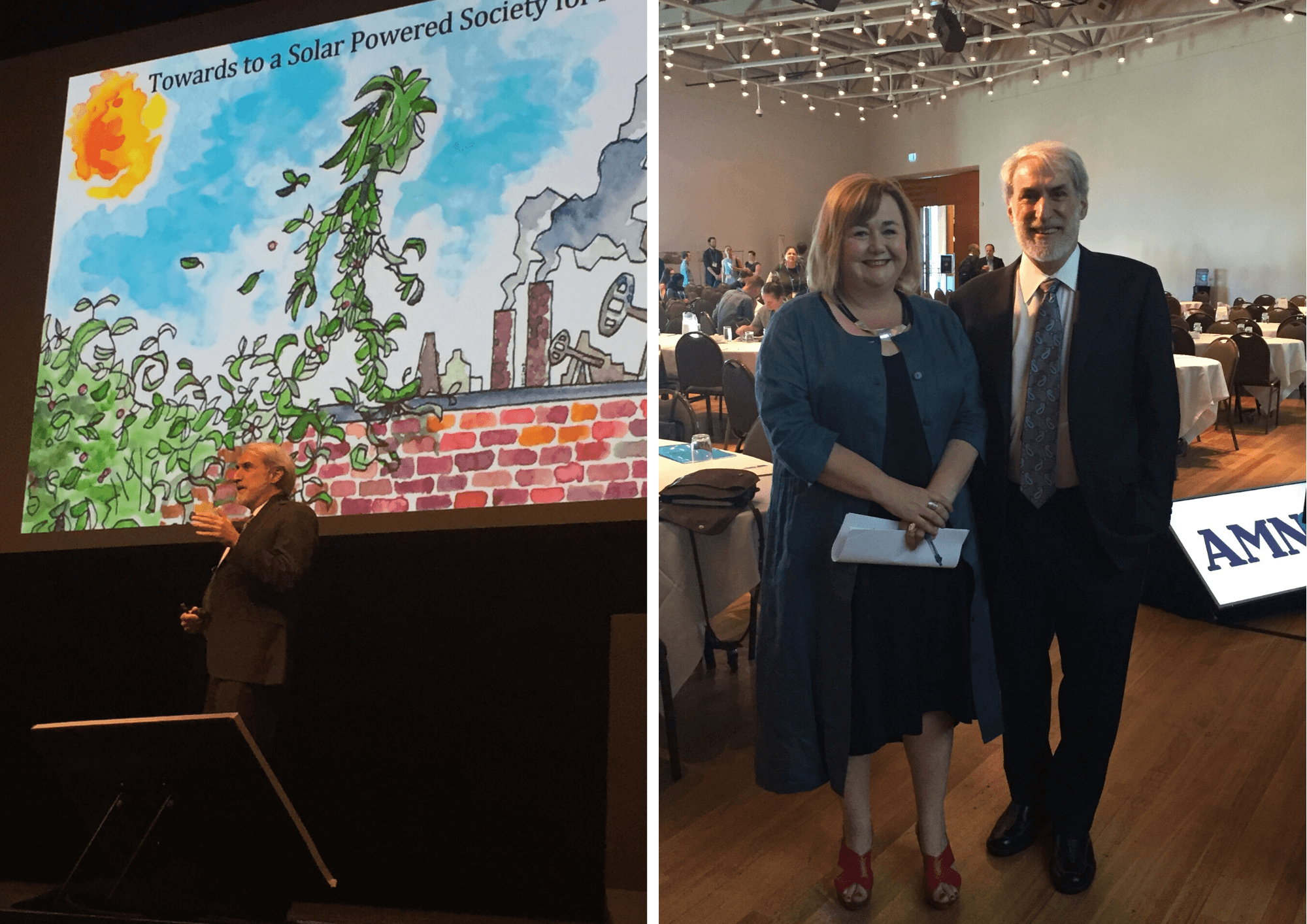AMN9 Speakers 2019
3 June, 2022
Over 400 delegates attended our 9th International Conference on Advanced Materials and Nanotechnology at Te Papa Tongarewa in Wellington, 10 – 14 February 2019, the biennial interdisciplinary conference that brings together material scientists, chemists, physicists, biologists and engineers to discuss the latest advances in nanotechnology and materials science.
In the lead up to AMN10 in 2023, we look back at some of the speakers from AMN9 (2019).
Plenary speaker: Professor Daniel G. Nocera

Professor Dan Nocera (left) speaking at AMN9 and (right) with NZ’s Minister for Research, Science and Technology, Hon Dr Megan Woods.
Headlining Plenary speaker, Professor Dan Nocera from Harvard University Professor, gave talks on transitioning to a solar-based society. One of a scientific talk for the AMN9 conference attendees and then an adapted one for the general public was attended by in excess of 150 people.
If you have poverty in the world, it will be impossible to have a sustainable planet.
Professor Dan Nocera AMN9 Plenary Speaker Harvard University
Professor Rose Amal
Professor Amal is recognised as a pioneer and leading authority in the fields of fine particle technology, photocatalysis and functional nanomaterials having made significant contributions to these related areas of research over the past 15 years. Her research contributions span from fundamental chemistry to applied chemical engineering fields; from material science and nano-research to a specialised photochemistry field.
Professor Michael Fuhrer
Professor Fuhrer directs the ARC Centre of Excellence for Future Low-Energy Electronics Technologies (FLEET) and co-directs the Monash Centre for Atromically Thin Materials. His research explores novel two-dimensional materials such as graphene, the two-dimensional surface state of three-dimensional topological insulators (e.g. Bi2Se3), and other two dimensional semiconductors, metals, and superconductors.
Professor Dr Joachim P. Spatz
Professor Spatz is director of the Max Planck Institute for Medical Research, he is also a Full Professor at the University of Heidelberg and head of the Dept. of Biophysical Chemistry. He is member of the Heidelberg Academy of Sciences and Humanities. Among other awards, he received the Gottfried Wilhelm Leibniz Prize of the Deutsche Forschungsgemeinschaft in 2017.
Distinguished Professor Dame Margaret Brimble
Distinguished Professor Dame Margaret Brimble has published over 460 papers, 60 reviews and is an inventor on over 30 patents. She discovered the first drug named “trofinetide” to treat Rett Syndrome and Fragile X syndrome that is in phase III clinical trials with Neuren Pharmaceuticals. Trofinetide is New Zealand’s first successful drug and one of only a few to be discovered in an academic laboratory. Margaret also co-founded the spin-out company SapVax with US$6 million funding from BioMotiv USA to take selfadjuvanting cancer vaccines based on a novel chemistry platform, to clinical trial.

AMN9 Plenary speakers
Keynote speakers
Professor Adam J. Engler - UC San Diego,
Dr Stephen Kupfer - Friedrich-Schiller-University Jena
Professor Norman O. Birge - Michigan State University
Professor Richard E. Palmer - Swansea University
Dr Anna Phan - IBM
Dr Thomas Watson - Intel Corporation
Associate Professor Brigitte M. Städler - Aarhus University
Dr Cathy Foley - CSIRO Manufacturing


